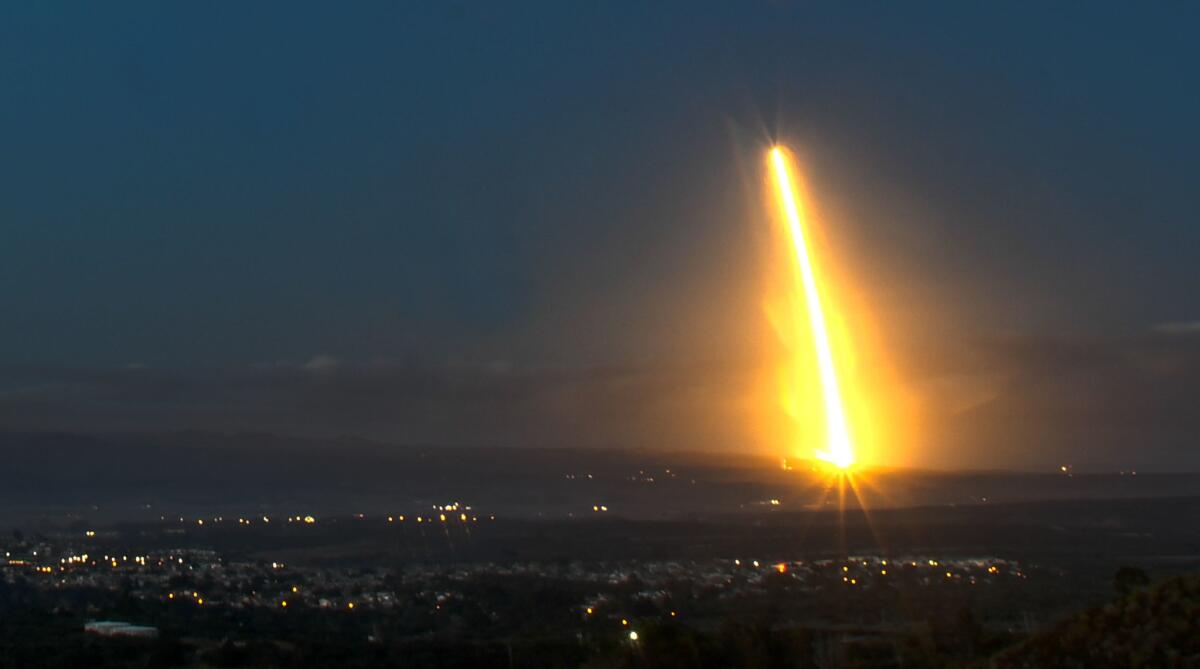Amazon’s entry into the satellite internet market sets up another faceoff between Jeff Bezos and Elon Musk

Elon Musk and Jeff Bezos already compete on satellite launch contracts for their respective rocket companies, SpaceX and Blue Origin.
Soon they will also face off in the potentially lucrative business of providing broadband internet via constellations of hundreds, or even thousands, of tiny satellites.
Last week, Bezos’ Amazon.com Inc. became the latest company to join the race already populated by SpaceX and OneWeb, both of which have launched their first satellites. And those two companies, as well as others, have received approval from the Federal Communications Commission to use spectrum for their constellations.
But while Amazon is the latest to join an already crowded field, analysts say the company’s deep pockets give it a good chance to edge out established competitors.
“The people who have got the most money and the best partners are going to be the ones that get to the end of this process,” said Tim Farrar, president of Menlo Park satellite and telecommunications consulting firm TMF Associates. “Jeff Bezos has been willing to invest money in Blue Origin, at least, without any need for near-term return on that investment.”
Amazon’s initiative, known as Project Kuiper, centers on a constellation of as many as 3,236 satellites in low-Earth orbit, according to filings with the International Telecommunication Union. That United Nations agency allocates satellite orbits and global radio spectrum and develops technical standards to help connect networks around the world.
Amazon said in a statement that Project Kuiper was a “long-term project” that would serve “tens of millions of people who lack basic access to broadband internet.”
That’s the same thinking behind other small-satellite constellations under development by SpaceX, Canadian satellite operator Telesat and OneWeb which counts British billionaire Richard Branson’s Virgin Group as an investor.
“I don’t know that there’s going to be just one company that’s going to dominate,” said Kristi Morgansen, professor and interim chair of the University of Washington’s department of aeronautics and astronautics. “As we’ve seen with internet providers and other kinds of infrastructure, there’s an array of opportunities.”
Satellite constellations could be poised to challenge the broadband industry »
Amazon could view its broadband service as a way to fully connect its end users to its home devices, many including the Alexa virtual assistant, or as a possible component of its envisioned drone delivery service, Farrar said. But there’s still uncertainty about how this market will play out.
“People have learned their lesson in the past that a lot of times, you don’t know whether this thing is going to be a massive success like satellite TV was … Or it’s going to be a massive failure like Iridium was in the ’90s,” Farrar said.
As technology improves and crucial electronics components get miniaturized, satellite manufacturers and operators have gravitated toward the idea of smaller, cheaper satellites that can be easily replenished in low-Earth orbit, rather than relying on large, expensive satellites that operate in a higher, geostationary orbit.
Some Earth-imaging satellites today are no larger than a loaf of bread.
Last year, Hawthorne-based SpaceX launched two demonstration satellites for its planned Starlink constellation that will eventually consist of thousands of objects in two different orbits. In February, OneWeb launched its first six satellites of a constellation that will eventually be made up of more than 650 devices.
For Amazon to succeed, the company may need to partner with another firm that has already filed paperwork with the Federal Communications Commission requesting spectrum for the satellites’ operation in the U.S., Farrar said. Otherwise, Amazon would be further back in the queue. SpaceX, OneWeb and others have already received approval for spectrum use.
Amazon seemed to hint as much in its statement, saying, “We look forward to partnering on this initiative with companies that share this common vision.”
“They [Amazon’s competitors] have a sizable head start,” said Eric Kronenberg, managing director in the aerospace, defense and aviation practice at consulting firm AlixPartners. “It takes a while to design, test and build these satellites.”
That doesn’t mean Amazon has accepted its status as underdog.
There are currently more than 70 jobs related to “Project Kuiper” listed on Amazon’s job site, including engineering positions to work on antenna and radio frequency systems, as well as satellite guidance, navigation and control systems.
Many of these jobs are based in Bellevue, Wash., just eight miles from SpaceX’s satellite-focused office in Redmond, Wash. That might set up a battle for talent.
Last summer, Musk reportedly fired some of the senior managers of the Starlink satellite broadband project because of disagreements over the speed of development and testing. One of those reportedly fired was Rajeev Badyal, a former Microsoft veteran who served as SpaceX’s vice president of satellites.
On Sunday, CNBC reported that Badyal is now running Project Kuiper. Amazon said in a statement that it does not comment on personnel as a “matter of company policy,” but that it “brought together an incredibly smart group of experts from across this industry to lead Project Kuiper.”
Musk added fuel to the fire earlier this week, replying to a tweet about the proposed Amazon constellation by mentioning Bezos’ Twitter handle and saying “copy” followed by the emoji for “cat.”
“It’s all part of the much bigger fight between Jeff Bezos and Elon Musk,” Farrar said. “Those two billionaires are in an ongoing war, and this is just one battle.”
Twitter: @smasunaga
More to Read
Inside the business of entertainment
The Wide Shot brings you news, analysis and insights on everything from streaming wars to production — and what it all means for the future.
You may occasionally receive promotional content from the Los Angeles Times.











